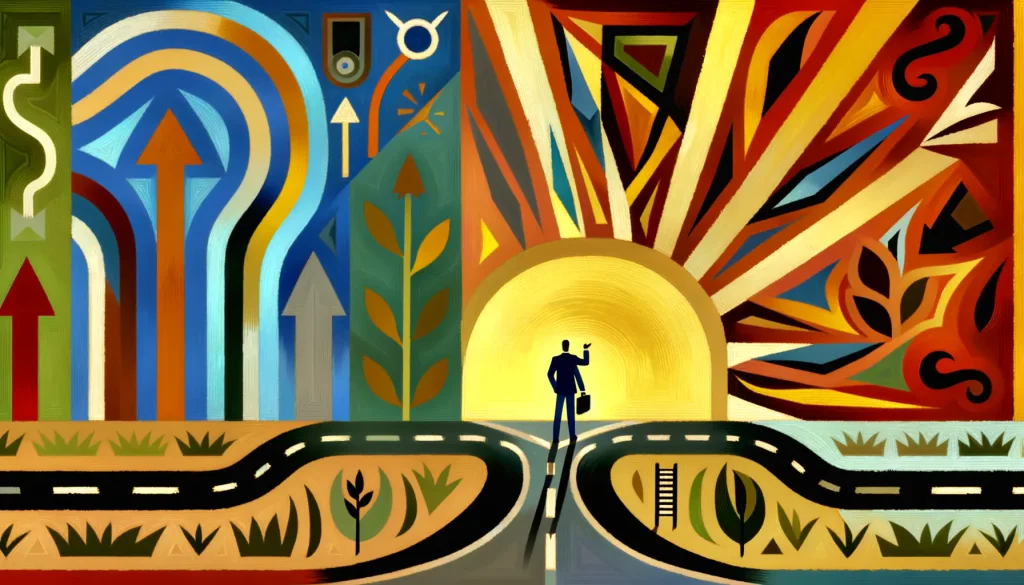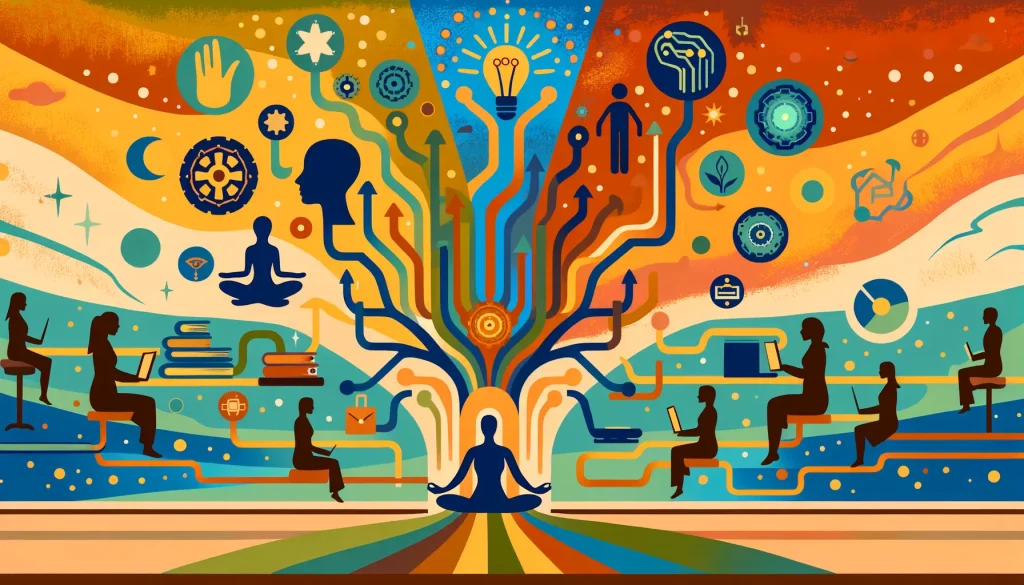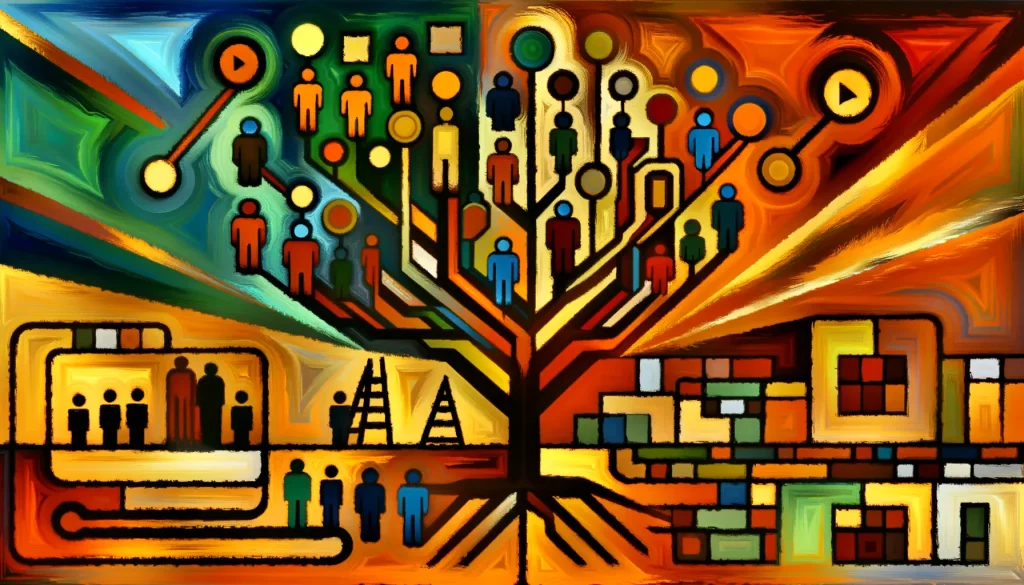Understanding the Signs It's Time for a Career Change
Have you been feeling that nagging sense something's not quite right with your work life? You're definitely not alone. Many professionals reach points in their careers where they feel the need for a significant change, but sometimes the signs aren't always obvious.
"I ignored the warning signs for years," shares Melissa, a former accountant now working as a UX designer. "I kept thinking the Sunday night dread was normal."
Let's talk about some key indicators that might be telling you it's time to explore new professional horizons:
• Chronic disengagement: If you find yourself consistently disinterested in your daily tasks and counting down the hours until you can leave, this is a major red flag.
• Value misalignment: When your personal values clash with your company culture or industry practices, it creates a constant internal friction that can be exhausting.
• Limited growth: Do you look ahead in your current career path and feel uninspired by what you see? As one client told me, "I realized I could see my entire professional future, and it bored me to tears."
• Physical symptoms: Career dissatisfaction often manifests physically too:
- Sleep disturbances
- Frequent headaches or digestive issues
- Unusual fatigue
- Increased illness from lowered immunity
The most telling sign? That sense of relief you feel when imagining yourself doing something completely different. That's your intuition giving you a pretty significant hint!
Essential Steps to Prepare for Your Career Transition
Once you've recognized it's time for a change, preparation becomes your best friend. A thoughtful approach now will save you countless headaches later.
Conducting a Thorough Self-Assessment
Before jumping into the job boards, take time to understand yourself better:
• Values clarification: What matters most to you in your work life? Autonomy? Creativity? Security? Social impact?
• Skill inventory: Make a comprehensive list of your capabilities, both technical and soft skills. As Jamie, a successful career changer put it, "I was surprised to discover how many transferable skills I already had when I really sat down and cataloged them."
• Interest exploration: What topics make you lose track of time? What sections of the bookstore or YouTube do you naturally gravitate toward?
Financial Preparation
Let's get practical – career changes often involve some financial adjustment:
• Create a transition budget that includes savings for potential education costs or a temporary income dip
• Consider how long you can sustain yourself if the transition takes longer than expected
• Explore whether part-time or freelance work could bridge financial gaps during your transition
"The financial planning I did beforehand gave me the confidence to actually make the leap," notes Raj, who transitioned from finance to environmental consulting. "Having that safety net was crucial for my peace of mind."
Exploring New Career Opportunities
The career landscape is more dynamic than ever, offering exciting possibilities that might not have existed even five years ago.
Industry Trends Worth Considering
Several sectors are showing particularly strong growth and opportunity:
• Sustainable and green technologies: From renewable energy to sustainable agriculture
• Healthcare technology: Telehealth, medical devices, and health informatics
• Cybersecurity: With increasingly sophisticated threats, demand continues to grow
• Artificial intelligence and data science: These fields are transforming virtually every industry
The Power of Informational Interviews
Don't underestimate this critical research tool. Reaching out to professionals already working in your target field provides invaluable insights:
• Aim for 5-7 conversations with people in various roles within your target industry
• Prepare thoughtful questions about day-to-day realities, challenges, and entry paths
• Listen for unspoken information about culture and work-life balance
"The most valuable information I got wasn't from job descriptions but from coffee chats with people actually doing the work," shares Alex, who successfully transitioned from teaching to corporate training.
Education and Upskilling Considerations
Be strategic about additional education:
• Investigate if certifications might be more valuable than full degrees in your target field
• Explore micro-credentials and online learning platforms like Coursera, LinkedIn Learning, or industry-specific training
• Consider whether volunteer work or project-based learning might provide both skills and portfolio materials
Creating Your Career Change Action Plan
Without a concrete plan, even the most exciting career change ideas can remain just that—ideas. Let's get tactical.
Setting a Realistic Timeline
Career transitions rarely happen overnight. Be thoughtful about mapping out:
• Short-term goals (1-3 months): Research, networking, skill development planning
• Medium-term goals (3-6 months): Education, portfolio building, informational interviews
• Long-term goals (6-12+ months): Job applications, interviews, industry immersion
Remember that flexibility is key. As Christine, now a successful data analyst after 15 years in retail management, notes: "My timeline shifted several times, and that's perfectly normal. The important thing was having a direction."
Updating Your Personal Brand
Your professional identity needs a refresh to align with your new direction:
• Audit your online presence, especially LinkedIn, to reflect your new career direction
• Create content or engage in conversations relevant to your target industry
• Consider how to tell your career change story in a compelling way that emphasizes continuity rather than disruption
• Resume renovation tips:
- Restructure to highlight transferable skills first
- Use a hybrid functional/chronological format to emphasize relevance
- Include relevant projects, volunteer work, or coursework
- Quantify achievements wherever possible
Overcoming Common Career Change Challenges
Let's be honest—career transitions come with their fair share of hurdles. Being prepared for these challenges makes them much less daunting.
Managing the Confidence Gap
Self-doubt is perhaps the most universal challenge career changers face:
• Create a "wins document" where you record all achievements and positive feedback
• Find a transition buddy—someone else making a similar change—for mutual support
• Develop specific mantras or affirmations that address your particular fears
"I felt like an impostor constantly," admits Tanya, who moved from accounting to marketing. "What helped was connecting with other career changers who reminded me that everyone starts somewhere."
Addressing Age-Related Concerns
Career changes happen at all life stages, but different ages bring different challenges:
• For mid-career changers: Emphasize the breadth of experience and professional maturity you bring
• For older workers: Highlight continuous learning and adaptability through specific examples
• For younger professionals: Focus on transferable skills and enthusiasm for the new direction
Closing Skill Gaps Effectively
Most career transitions involve some skill development:
• Prioritize learning based on job descriptions in your target role
• Consider finding a mentor who can guide your skill development journey
• Look for "bridge projects" that allow you to practice new skills while leveraging existing ones
Successfully Landing Your New Role
The final stage of your career change journey involves strategic job searching tailored to your unique situation.
Career-Changer Job Search Strategies
Traditional job search methods may need adjustment when you're changing careers:
• Focus more heavily on networking (70-80% of your effort) than on job boards
• Target companies rather than just open positions—sometimes roles can be created for the right candidate
• Consider contract or project work to build experience and relationships in your new field
"I got my foot in the door through a three-month contract," explains Marco, who transitioned from teaching to instructional design. "It gave them a chance to see my value directly, without the risk of a permanent hire."
Mastering the Career Change Interview
Interviews can be particularly challenging for career changers:
• Prepare concise, compelling stories that connect your past experience to this new direction
• Anticipate and practice addressing concerns about your transition
• Demonstrate enthusiasm for the field through specific examples of what you've already done to immerse yourself
• Sample response to the "why this change" question:
"My background in customer service developed my ability to understand user needs and communicate complex information clearly. As I began exploring UX design through online courses and volunteer projects, I realized these skills transfer perfectly to creating intuitive digital experiences. What excites me most about this role is the opportunity to combine my people skills with my growing technical abilities to solve meaningful problems."
Remember, every successful career changer was once exactly where you are now—taking that first brave step toward a more fulfilling professional life!
Conclusion
Making a career change is a journey that requires courage, planning, and persistence. By following these structured steps and staying committed to your goals, you're well-equipped to make a successful transition. Remember, it's never too late to pursue work that aligns with your values and aspirations. Take that first step today, whether it's updating your skills or reaching out to someone in your target industry. Your new career adventure awaits!






